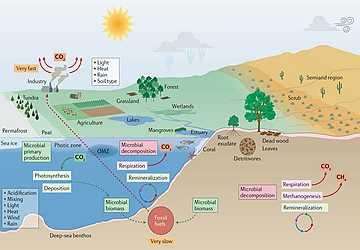Scientists have made tremendous gains in comprehending climate change's biological and physical aspects, from decoding previous changes to predicting future ones.

While our understanding of the physical sciences of climate continues to expand, a gap is beginning to appear: what will the social and economic effects of climate change and efforts to reduce greenhouse gas emissions be?
Carbon emissions' actual cost
Each metric ton of carbon emissions today is estimated to cost society and the economy a sum of money in the future, and this sum is known as the social cost of carbon (SCC). It may also be viewed as the monetary benefit to society from averting the expenses associated with repairing the effects of releasing an extra ton of carbon into the atmosphere.
The SCC has been adopted as a fundamental policy measurement in existing regulations. However, problems with the current estimates must be addressed if we are to make effective policy decisions in light of climate change.
The current SCC formula ignores crucial details. For example, how do economists calculate the "non-market" costs of climate-related disasters like war, disease outbreaks, and forest loss? To what extent climate change hinders economic development in various regions? Can farmers adjust their crop selections and planting schedules to mitigate income losses?
There is a compelling need to accurately calculate carbon's social cost because of its impact on policy. Moreover, this is a field where we should be able to make quick strides in our knowledge.

Which methods of reducing pollution output work the best?
Once scientists settle on the real price of carbon, they'll have a wide range of policy levers at their disposal to reduce emissions. Industry restrictions and renewable energy subsidies are popular policy alternatives worldwide. However, they may be less effective at reducing emissions than carbon emission licenses or carbon pricing.
Until we know about the pros and cons of various carbon pricing strategies, governments are essentially flying blind when it comes to climate mitigation policies. Making a compelling economic argument for one approach over another helps bring political backing for action in the form of carbon pricing schemes closer to their true benefits and costs.
How do the world's developing nations contribute?
Although developing countries increasingly account for a greater share of global greenhouse gas emissions, the vast majority of existing studies on climate economics focus on developed nations. The economies of poorer countries may be more vulnerable to climate change because of the varied policy framework in which they operate.
More research is required to understand the climate policy options available to governments in developing nations and how those options may affect the likelihood of different impacts in certain countries.
Lack of financial resources is the main obstacle.
Both economists and scientists face challenging research problems, but economics has received substantially less funding for research, resulting in a significantly smaller workforce and slower progress.
Scientists worldwide use the same climate models and compare their findings to predict the planet's climate. The economics community is only beginning to work together this way, and I believe the results will be extremely beneficial. There is a case for investing in further study to better grasp climate change's social and economic repercussions. Investing more money into the social sciences can have a significant impact.


